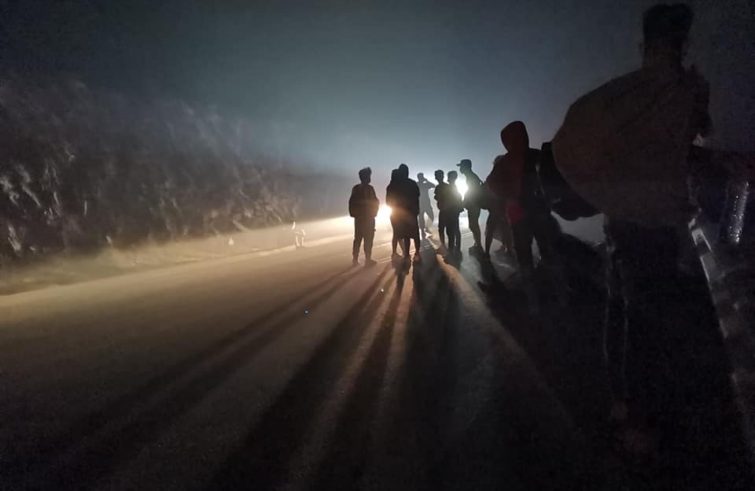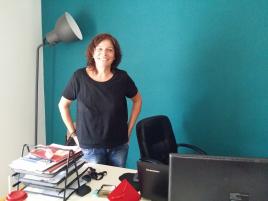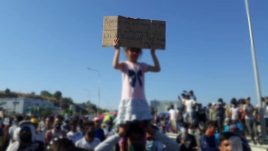
Children with face masks sleeping on streets, families stranded on the beach are amongst those left homeless – 11 thousand on a total of 13,000 people who previously lived in the Moira camp. Of these, 3,800 are children. They are all without shelter, not even a tent, after the devastating fire that broke out a week ago. The military are patrolling the entrance to Moria migrant camp and prevent asylum seekers from reaching the city of Mytilene, the capital of the island of Lesvos, for security reasons. People are subjected to long and exhausting queues under the sun, to be tested for Covid-19 (20 positive cases) or to receive food and water, distributed by the Greek army. The Greek government is in the process of creating a new makeshift refugee camp. The UNHCR supplied 600 family tents that gave shelter to approximately 700 people, in addition to basic necessities. But tensions are mounting both among asylum seekers and the local population. If no reasonable solutions are found quickly, it is likely to cause further dramatic incidents. “It’ a tragedy, especially because the atmosphere on the island has changed. Clashes and tension might break out in the coming days, even against the police and the army. Asylum seekers are overcome by deep anguish and despair”. Maria Alverti, director of Caritas Hellas/Caritas Greece, currently in Lesvos to coordinate humanitarian relief with the representatives of the institutions, reported on the situation.
 Caritas distributes water and sleeping bags. Caritas has already distributed 2,000 bottles of water and is waiting for authorization to distribute 2,500 sleeping bags and water on a daily basis. It is also offering the support of translators, social workers, psychologists, who are already working in the nearby Kara Tepe camp: “We are waiting to receive from them a list of necessities and priority items, if not, there is little we can do”.
Caritas distributes water and sleeping bags. Caritas has already distributed 2,000 bottles of water and is waiting for authorization to distribute 2,500 sleeping bags and water on a daily basis. It is also offering the support of translators, social workers, psychologists, who are already working in the nearby Kara Tepe camp: “We are waiting to receive from them a list of necessities and priority items, if not, there is little we can do”.
 Joint appeal to the EU. The staff of Caritas Hellas in Lesvos consists of seven people working in the vulnerable people camp of Kara Tepe, smaller and in less inhuman conditions compared to Moria, largely referred to as “the hell of Europe.” Here thousands of Syrian, Afghan, Iraqi, Bangladeshi, sub-Saharan refugees were left stranded on the island for months and years due to EU-Turkey agreements. Some days ago Caritas Hellas and Caritas Europe issued a joint appeal calling on the European Union and its the Member States to intervene and welcome asylum seekers from Lesvos into their territories. So far only 407 unaccompanied minors have been transferred to Thessaloniki.
Joint appeal to the EU. The staff of Caritas Hellas in Lesvos consists of seven people working in the vulnerable people camp of Kara Tepe, smaller and in less inhuman conditions compared to Moria, largely referred to as “the hell of Europe.” Here thousands of Syrian, Afghan, Iraqi, Bangladeshi, sub-Saharan refugees were left stranded on the island for months and years due to EU-Turkey agreements. Some days ago Caritas Hellas and Caritas Europe issued a joint appeal calling on the European Union and its the Member States to intervene and welcome asylum seekers from Lesvos into their territories. So far only 407 unaccompanied minors have been transferred to Thessaloniki.
 Germany’s availability. Germany said it would be ready to welcome 1,500 refugees and yesterday human rights activists released the picture of 109 vulnerable people about to board a flight to Germany.
Germany’s availability. Germany said it would be ready to welcome 1,500 refugees and yesterday human rights activists released the picture of 109 vulnerable people about to board a flight to Germany.
 Relocation. “It doesn’t matter whether the fire was an arson or an accident .
Relocation. “It doesn’t matter whether the fire was an arson or an accident .
The situation has been disastrous for the past five years. We cannot go on like this”,
remarked Maria Alverti. The Greek government’s plan does not envisage the relocation of Moria camp’s refugees to mainland Greece or other islands. Although some small steps have been taken. “In my opinion – she went on – they don’t want to publicly disclose the fact that after the fire everyone will be transferred elsewhere. They don’t want to give this message to the population”. However, while “it’s materially feasible” for European States to welcome the evacuees from the Moria camp, “it is not politically viable, as they fear passing the message: ‘Come to Greece since Europe will open its borders'”. In her view we need “a common European approach to migration, in compliance with human rights. Greece cannot be left to handle everything alone.”
 A new makeshift migrant camp is not sufficient. For now, it seems that the Greek government will endeavour to stabilize the situation in Lesvos by relocating people to a new camp in Moria. “But it’s September now, what will happen in November?”, asks the director of Caritas Hellas: “They will not be welcomed into safe lodges but in temporary facilities where they can stay no longer than a month. What will happen with the cold weather and strong northerly wind blowing on our islands?”
A new makeshift migrant camp is not sufficient. For now, it seems that the Greek government will endeavour to stabilize the situation in Lesvos by relocating people to a new camp in Moria. “But it’s September now, what will happen in November?”, asks the director of Caritas Hellas: “They will not be welcomed into safe lodges but in temporary facilities where they can stay no longer than a month. What will happen with the cold weather and strong northerly wind blowing on our islands?”
Risk of high tension and clashes. Caritas Greece is particularly worried about external and internal tensions amidst local extremists who have been displaying widespread hostility against asylum seekers and NGOs for a long time – access to Mytilene is forbidden for security reasons – and conflicts inside the camp among the refugees themselves and against the police. “Some activists are warning refugees not to move to the new facility as they would thus be prevented from being transferred to mainland Greece”, she said. “The most vulnerable families are willing to go anywhere but others are resisting and refusing to move into the new camp”. Unfortunately, she pointed out,
“there is a major security problem. With thousands of people stranded on the streets, no one can guarantee what could happen next.”
Meanwhile last Sunday, during the Angelus prayer, Pope Francis reiterated his plea for hospitality and voiced his closeness to the suffering in Lesvos, recalling his historic visit in 2016. At the time, he took with him back to Rome, aboard the papal plane, some of the most vulnerable refugees, and hosted them in the Vatican. In the following years 67 refugees arrived from the Greek island, thanks to the humanitarian corridors promoted by the Office for Papal charities together with the Community of Sant’Egidio.











